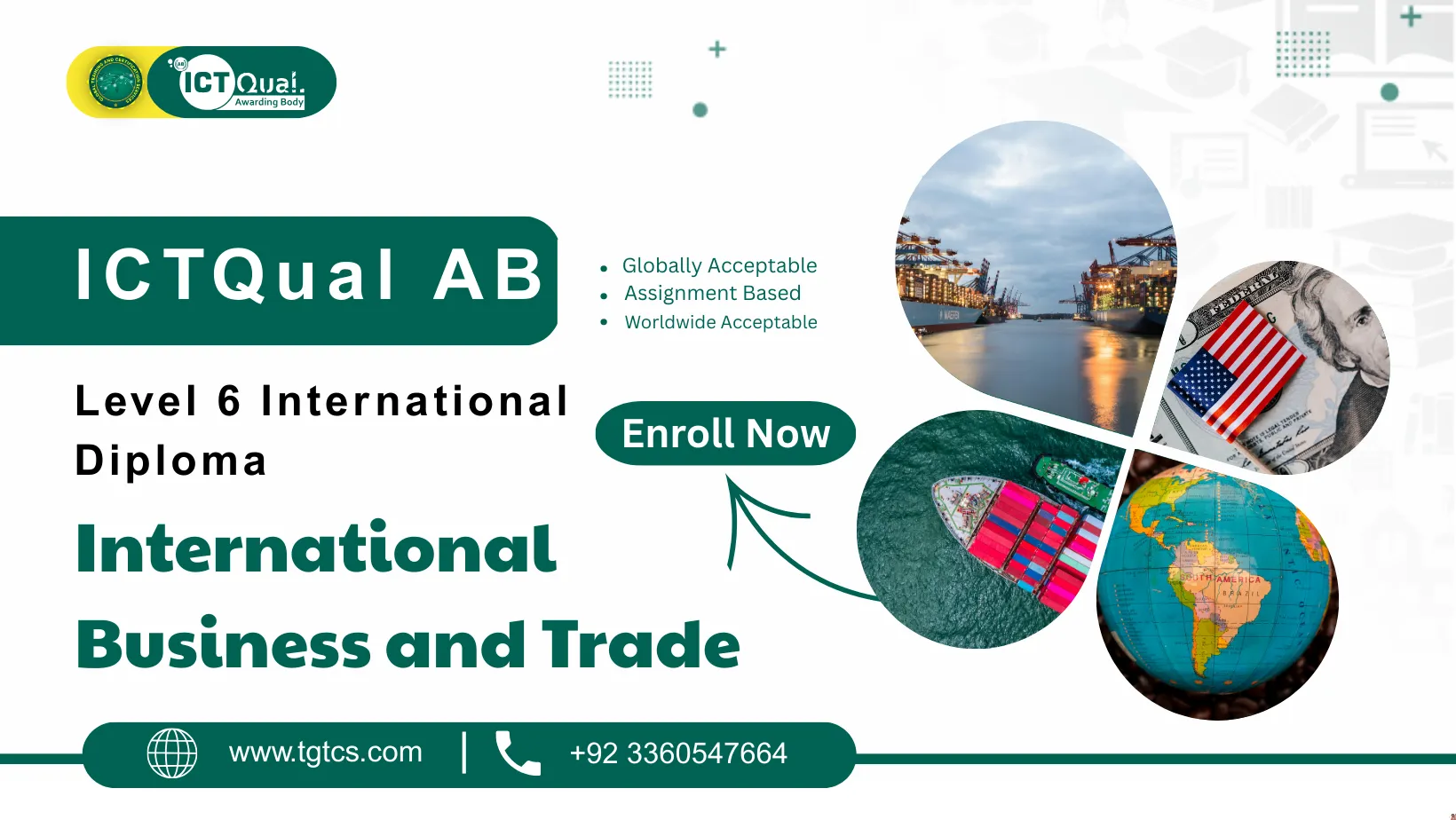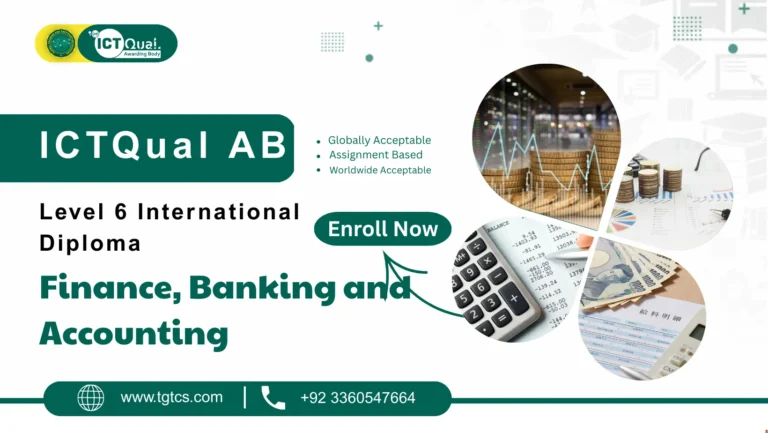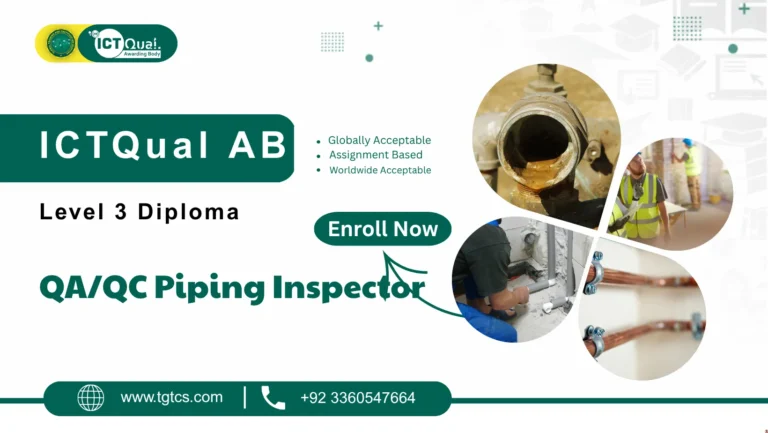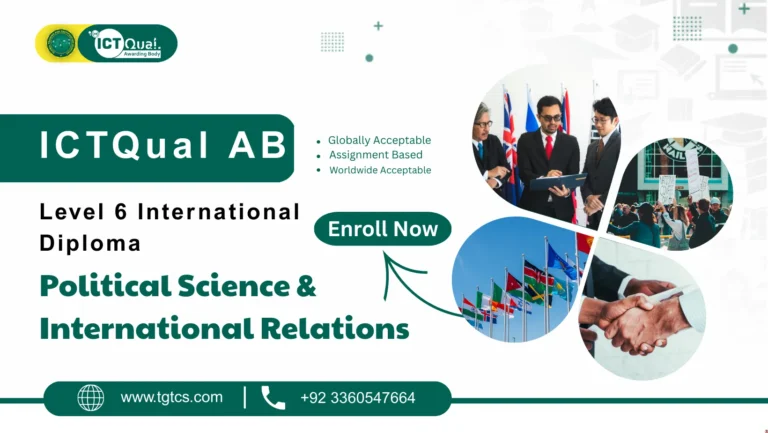ICTQual AB Level 6 International Diploma in International Business and Trade
The ICTQual AB Level 6 International Diploma in International Business and Trade offers professionals and aspiring entrepreneurs the knowledge, skills, and practical insights needed to navigate the complexities of global commerce effectively. This 360-credit, fully assignment-based program allows learners to study at their own pace, from anywhere in the world, ensuring flexibility without compromising academic rigor.
The purpose of ICTQual AB Level 6 International Diploma in International Business and Trade is to provide a comprehensive understanding of international business operations, trade policies, global marketing strategies, financial management, and cross-cultural negotiation. By the end of the course, learners will be equipped with the expertise to manage international trade activities, develop business expansion strategies, and make informed decisions in dynamic global markets. The curriculum emphasizes both theoretical frameworks and practical applications, preparing graduates for leadership roles in multinational corporations, export-import businesses, trade consultancy, and global supply chain management.
This prestigious International Business and Trade qualification is British Council verifiable and can be attested by MOFA and embassies, making it ideal for career advancement, job opportunities, and iqama approval in Gulf countries. By earning this diploma, learners gain a globally recognized certification that enhances professional credibility and opens doors to international career prospects. Whether you are seeking to elevate your business acumen or expand your professional horizons, this International Business and Trade program provides the tools and confidence to thrive in the global marketplace.
The Global Training and Certification Services is Approved Training Centre of ICTQual AB UK Ltd
The ICTQual AB Level 6 International Diploma in International Business and Trade is a prestigious 360-credit program designed for professionals, entrepreneurs, and ambitious students seeking advanced expertise in global commerce. This fully assignment-based diploma allows learners to study at their own pace, from anywhere in the world, providing unmatched flexibility for busy professionals.
This internationally recognized Business and Trade qualification is British Council verifiable and MOFA and Embassy attested, making it ideal for career advancement, employment opportunities, and iqama approval in Gulf countries. The course offers comprehensive coverage of international business operations, trade policies, global marketing strategies, cross-cultural negotiation, and financial management. Learners gain both theoretical knowledge and practical skills, preparing them for leadership roles in multinational corporations, trade consultancy, export-import businesses, and global supply chain management.
By completing this diploma, participants develop critical skills in strategic decision-making, international trade management, and business expansion, enhancing their professional credibility and employability in global markets. The program’s flexible, self-paced structure ensures that learners can balance study with professional and personal commitments while earning a globally recognized Level 6 certification.
Mandatory Unit
This qualification, the ICTQual AB Level 6 International Diploma in International Business & Trade, consists of 36 mandatory units.
Year 1 – Core Foundations in International Business
- Principles of International Business and Trade
- Fundamentals of Global Economics
- Business Law and International Regulatory Frameworks
- Introduction to Marketing in a Global Context
- Organisational Behaviour and Management Principles
- Business Accounting and Financial Reporting
- Supply Chain and Logistics Management Basics
- Business Data Analysis and Research Skills
- International Business Communication and Negotiation
- Information Technology for Business Operations
- Professional Skills for Global Business Careers
- Corporate Social Responsibility and Sustainability Fundamentals
Year 2 – Applied International Business Practices
- International Trade Law, Tariffs, and Policy
- Strategic Marketing for International Markets
- International Banking and Financial Systems
- Cross-Cultural Leadership and Management
- Global Human Resource Management
- Operations and Supply Chain in Global Business
- International Risk Management and Compliance
- Political Economy and International Trade Relations
- Business Analytics for Decision-Making
- Digital Trade and E-Commerce Innovation
- Project and Programme Management in Business
- Ethics, Governance, and Sustainability in International Trade
Year 3 – Advanced Global Business Strategy & Leadership
- Strategic Management in International Business
- Advanced International Trade Theories and Practices
- Global Finance, Investment, and Capital Markets
- Leadership, Change, and Organisational Transformation
- International Entrepreneurship and Innovation
- Trade Diplomacy, International Negotiations, and Policy-Making
- Emerging Markets and Global Business Opportunities
- Crisis and Risk Management in Global Business
- Advanced Research Methods for International Business
- Dissertation / Final Research Project in International Business & Trade
- Global Business Strategy and Competitive Advantage
- Future Trends in International Business, Technology, and Trade
Year 1 – Core Foundations in International Business
1. Principles of International Business and Trade
- Understand the fundamentals of international trade and global business operations.
- Identify key drivers of international business growth and market expansion.
- Analyze the impact of cultural, political, and economic factors on global trade.
- Evaluate international trade structures, agreements, and partnerships.
- Apply core business principles to global market scenarios.
2. Fundamentals of Global Economics
- Explain macroeconomic and microeconomic principles affecting international markets.
- Analyze global economic trends and their implications for business strategy.
- Assess the effects of currency fluctuations and international trade balances.
- Evaluate economic policies and frameworks in various countries.
- Apply economic reasoning to business decision-making in global markets.
3. Business Law and International Regulatory Frameworks
- Understand key international trade laws and regulations.
- Analyze the legal requirements for global business transactions.
- Evaluate compliance strategies for multinational operations.
- Apply knowledge of intellectual property, contracts, and dispute resolution.
- Examine regulatory frameworks governing international trade agreements.
4. Introduction to Marketing in a Global Context
- Understand international marketing principles and global branding strategies.
- Analyze global consumer behavior and market segmentation techniques.
- Develop marketing strategies for cross-border product and service promotion.
- Apply digital and traditional marketing tools to international markets.
- Evaluate the impact of culture, ethics, and sustainability on marketing decisions.
5. Organisational Behaviour and Management Principles
- Analyze individual and group behavior in multinational organizations.
- Apply leadership and motivational theories to diverse teams.
- Understand organizational culture and its influence on performance.
- Develop management strategies for operational efficiency and team collaboration.
- Evaluate approaches to conflict resolution and decision-making in global contexts.
6. Business Accounting and Financial Reporting
- Understand fundamental accounting principles for international businesses.
- Prepare and interpret financial statements and reports.
- Analyze financial ratios to evaluate organizational performance.
- Apply accounting standards and compliance for multinational operations.
- Use financial data to support strategic business decisions.
7. Supply Chain and Logistics Management Basics
- Understand global supply chain operations and logistics management principles.
- Analyze procurement, inventory, and distribution processes.
- Evaluate strategies to improve efficiency and reduce operational costs.
- Apply risk management practices in supply chain operations.
- Use technology and data analytics for logistics optimization.
8. Business Data Analysis and Research Skills
- Develop data collection and analysis techniques for business research.
- Apply quantitative and qualitative research methods to solve business problems.
- Interpret statistical results to support strategic decision-making.
- Evaluate market trends and performance metrics using analytical tools.
- Communicate research findings effectively for business applications.
9. International Business Communication and Negotiation
- Develop professional communication skills for global business contexts.
- Apply negotiation techniques across cultures and business environments.
- Understand cross-cultural communication challenges and solutions.
- Prepare formal business documents, reports, and presentations.
- Enhance interpersonal skills to build international business relationships.
10. Information Technology for Business Operations
- Understand IT systems and digital tools for global business operations.
- Apply software solutions to optimize business processes and decision-making.
- Evaluate the impact of emerging technologies on international trade.
- Ensure cybersecurity and data privacy in digital business operations.
- Integrate IT solutions with organizational strategies for operational efficiency.
11. Professional Skills for Global Business Careers
- Develop leadership, teamwork, and time management skills for international roles.
- Enhance problem-solving and critical thinking for professional growth.
- Prepare for professional networking, interviews, and career advancement.
- Apply ethical decision-making in business scenarios.
- Build a professional portfolio showcasing skills and competencies.
12. Corporate Social Responsibility and Sustainability Fundamentals
- Understand CSR principles and their importance in global business.
- Evaluate sustainable business practices and environmental strategies.
- Develop CSR initiatives aligned with organizational goals.
- Analyze the social, ethical, and economic impacts of corporate decisions.
- Apply sustainability frameworks to enhance corporate reputation.
Year 2 – Applied International Business Practices
13. International Trade Law, Tariffs, and Policy
- Understand international trade regulations, tariffs, and customs procedures.
- Analyze the impact of trade policies on global business strategies.
- Evaluate trade agreements and regulatory frameworks.
- Apply legal principles to manage cross-border trade operations.
- Ensure compliance with international trade laws and practices.
14. Strategic Marketing for International Markets
- Develop marketing strategies for diverse global markets.
- Apply market research to identify opportunities in international trade.
- Analyze competitive positioning and branding strategies globally.
- Integrate digital marketing tools in international campaigns.
- Evaluate marketing performance and adapt strategies accordingly.
15. International Banking and Financial Systems
- Understand global financial institutions, banking operations, and markets.
- Analyze international payment systems and currency exchange mechanisms.
- Evaluate financial risks and mitigation strategies for global trade.
- Apply knowledge of investment, credit, and financing in international operations.
- Ensure compliance with global banking regulations and standards.
16. Cross-Cultural Leadership and Management
- Develop leadership skills in multicultural and multinational environments.
- Analyze cultural differences impacting communication, decision-making, and negotiation.
- Apply effective team management techniques across borders.
- Develop strategies to enhance employee engagement and performance globally.
- Evaluate leadership models for international organizational success.
17. Global Human Resource Management
- Understand HR strategies for global organizations.
- Apply talent acquisition, training, and retention techniques internationally.
- Evaluate performance management and employee development systems.
- Ensure compliance with international labor laws and ethical standards.
- Develop HR policies aligned with global business objectives.
18. Operations and Supply Chain in Global Business
- Analyze operational strategies for multinational enterprises.
- Optimize supply chain processes for efficiency and cost-effectiveness.
- Apply lean management and quality assurance techniques globally.
- Evaluate logistics and distribution networks for international trade.
- Manage operational risks in cross-border business activities.
19. International Risk Management and Compliance
- Identify global business risks including financial, political, and operational.
- Develop risk mitigation strategies for international operations.
- Ensure compliance with international regulatory and legal standards.
- Analyze case studies on corporate risk management practices.
- Apply ethical decision-making in risk scenarios.
20. Political Economy and International Trade Relations
- Understand the impact of political and economic factors on trade.
- Analyze international relations and their effect on business operations.
- Evaluate trade policies, sanctions, and economic alliances.
- Apply political economy concepts to develop global business strategies.
- Assess geopolitical risks affecting international trade.
21. Business Analytics for Decision-Making
- Apply data analytics to support strategic business decisions.
- Interpret quantitative and qualitative insights from market and financial data.
- Use analytical tools to forecast trends and optimize operations.
- Evaluate business performance metrics for international operations.
- Communicate analytical findings to stakeholders effectively.
22. Digital Trade and E-Commerce Innovation
- Understand digital trade frameworks and global e-commerce trends.
- Analyze the impact of technology on international business operations.
- Develop e-commerce strategies for global markets.
- Apply digital tools for cross-border sales and marketing.
- Evaluate cybersecurity and digital compliance risks.
23. Project and Programme Management in Business
- Apply project management principles to international business initiatives.
- Plan, execute, and monitor projects in global contexts.
- Analyze project risks and implement mitigation strategies.
- Evaluate project outcomes and business impact.
- Use tools and techniques for effective program management.
24. Ethics, Governance, and Sustainability in International Trade
- Understand ethical principles in international business.
- Evaluate governance frameworks for multinational organizations.
- Develop sustainability strategies aligned with global standards.
- Apply ethical decision-making in complex trade scenarios.
- Assess the long-term social and environmental impact of business operations.
Year 3 – Advanced Global Business Strategy & Leadership
25. Strategic Management in International Business
- Formulate and implement strategic plans for multinational enterprises.
- Analyze competitive environments and global business trends.
- Evaluate strategic options for growth, diversification, and market entry.
- Apply performance measurement tools to assess strategic effectiveness.
- Develop leadership approaches to drive strategic objectives.
26. Advanced International Trade Theories and Practices
- Understand modern theories of international trade and investment.
- Analyze global market trends using trade models and frameworks.
- Apply trade theories to real-world international business scenarios.
- Evaluate the impact of globalization on trade policies and practices.
- Develop strategies to enhance competitive advantage in global markets.
27. Global Finance, Investment, and Capital Markets
- Understand international financial markets and investment instruments.
- Analyze capital flow, risk, and return in global investment decisions.
- Evaluate financing strategies for multinational operations.
- Apply financial management principles for global business expansion.
- Assess the impact of international financial regulations and policies.
28. Leadership, Change, and Organisational Transformation
- Develop transformational leadership skills for global organizations.
- Analyze organizational change processes and frameworks.
- Apply strategies to manage resistance and drive cultural change.
- Evaluate leadership styles and their impact on performance.
- Lead international teams through change and innovation initiatives.
29. International Entrepreneurship and Innovation
- Identify opportunities for entrepreneurial ventures in global markets.
- Apply innovation strategies to develop competitive business solutions.
- Evaluate risks and feasibility of international business startups.
- Develop business models for sustainable global entrepreneurship.
- Implement strategic planning and innovation management practices.
30. Trade Diplomacy, International Negotiations, and Policy-Making
- Understand the role of diplomacy in international trade relations.
- Develop negotiation strategies for cross-border agreements.
- Evaluate trade policies, treaties, and economic alliances.
- Apply diplomatic approaches to resolve conflicts in international trade.
- Influence policy-making to support organizational objectives.
31. Emerging Markets and Global Business Opportunities
- Analyze economic, political, and social trends in emerging markets.
- Evaluate market entry strategies and investment opportunities.
- Develop risk management approaches for high-growth economies.
- Apply international business strategies to capitalize on new markets.
- Assess long-term potential and competitive positioning in emerging regions.
32. Crisis and Risk Management in Global Business
- Identify potential crises affecting multinational enterprises.
- Develop strategies for risk assessment and mitigation.
- Apply crisis management frameworks in international contexts.
- Evaluate communication and operational responses during business disruptions.
- Ensure continuity and resilience in global operations.
33. Advanced Research Methods for International Business
- Apply advanced research methodologies for global business analysis.
- Conduct quantitative and qualitative research in international trade contexts.
- Analyze data to derive actionable business insights.
- Develop structured research proposals and reports.
- Communicate research findings effectively for academic and professional purposes.
34. Dissertation / Final Research Project in International Business & Trade
- Conduct independent research on a relevant international business topic.
- Apply theoretical frameworks and research methodologies to solve real-world problems.
- Analyze data and draw evidence-based conclusions.
- Develop professional report writing and presentation skills.
- Demonstrate mastery of knowledge and practical application in international business.
35. Global Business Strategy and Competitive Advantage
- Formulate strategies to achieve sustainable competitive advantage globally.
- Analyze industry trends, market dynamics, and competitor behavior.
- Apply strategic tools to evaluate performance and growth opportunities.
- Develop strategic initiatives for market expansion and innovation.
- Integrate leadership and management practices into strategic planning.
36. Future Trends in International Business, Technology, and Trade
- Identify emerging trends in global business, technology, and trade practices.
- Evaluate the impact of digitalization, AI, and innovation on international commerce.
- Develop strategies to adapt to future business challenges.
- Anticipate shifts in global markets and trade regulations.
- Apply forward-thinking approaches to sustain long-term organizational success.
The “ICTQual AB Level 6 International Diploma in International Business and Trade” offers numerous benefits to individuals seeking to advance their careers. Here are some key advantages:
Comprehensive International Business Knowledge
- Gain in-depth understanding of global business principles, international trade, and economics.
- Learn modern theories and practical applications to manage multinational operations.
- Master cross-cultural communication, negotiation, and leadership in international settings.
Career Advancement Opportunities
- Enhance your employability in international trade, business management, and global corporations.
- Open doors to leadership, strategic, and managerial roles worldwide.
- Prepare for high-demand positions in multinational companies, trade organizations, and global consultancies.
Practical Skills Development
- Develop hands-on skills in financial analysis, business analytics, project management, and digital trade.
- Learn to apply marketing strategies, HR management, and supply chain optimization in global contexts.
- Gain expertise in risk management, governance, ethics, and sustainability for real-world applications.
Flexible and Self-Paced Learning
- Complete the 360-credit, assignment-based program at your own pace from anywhere in the world.
- Manage study schedules according to personal and professional commitments.
- Access course materials online for continuous learning and skill enhancement.
Recognized and Verifiable Certification
- Obtain a British Council-verifiable, MOFA and Embassy-attestable qualification.
- Gain a globally recognized diploma suitable for job applications and iqama approval.
- Showcase a credible credential that strengthens your professional profile.
Global Networking and Professional Growth
- Connect with international peers, instructors, and business professionals.
- Enhance your professional portfolio and develop leadership, critical thinking, and problem-solving skills.
- Prepare for global business challenges and emerging market opportunities with confidence.
The “ICTQual AB Level 6 International Diploma in International Business and Trade” is ideally suited for a specific audience, including:
Business Professionals Seeking Global Exposure
- Individuals working in multinational companies who want to enhance their international business knowledge.
- Managers aiming to develop leadership and strategic skills for global operations.
- Professionals involved in trade, marketing, finance, or supply chain management seeking global expertise.
Aspiring International Business Leaders
- Learners who want to take on senior management, executive, or strategic roles in global organizations.
- Entrepreneurs looking to expand their business into international markets.
- Professionals aiming to lead cross-cultural teams and manage international projects effectively.
Recent Graduates and Career Switchers
- Graduates in business, economics, finance, or related fields who want to specialize in international trade.
- Individuals seeking a career transition into global business, trade, or international management roles.
- Learners aiming to build a strong foundation in international business practices and strategy.
Professionals Seeking Recognized Certification
- Individuals requiring a British Council-verifiable, MOFA and Embassy-attestable qualification.
- Learners seeking credentials for job applications, iqama approval, or career advancement in international markets.
- Professionals who value globally recognized diplomas to enhance their resume and credibility.
Self-Motivated and Independent Learners
- Individuals who prefer flexible, assignment-based learning at their own pace.
- Learners comfortable with online study and digital resources from anywhere in the world.
- Professionals aiming to balance personal, professional, and academic commitments while gaining a high-level qualification.
Course Overview
Course Level
Level 6
Course Units
36 Units
Credits
360
Duration
3 years






